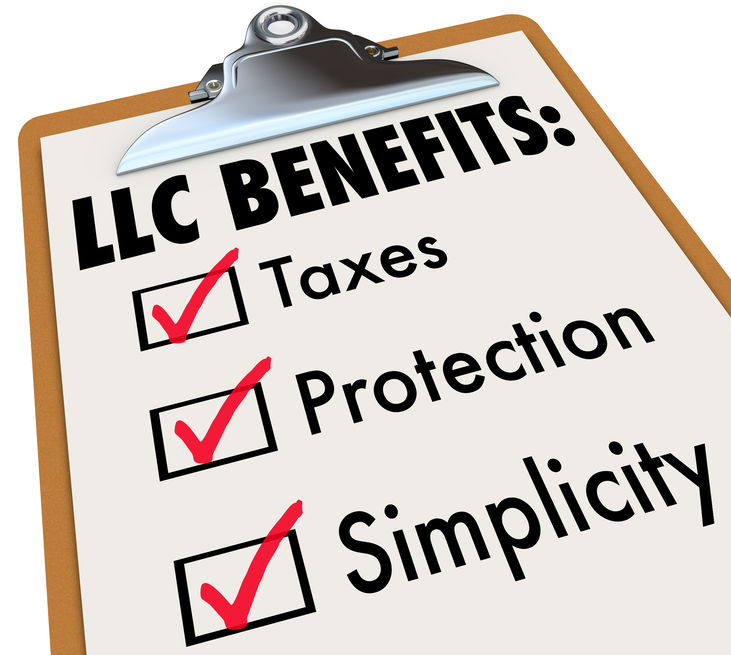

Today, many businesses are forming as a Limited Liability Company (LLC) and are finding that an LLC offers the “best of both worlds” of corporate forms. LLCs have pass-through taxation while also affording the owners limited liability protection, typical of a corporation. One advantage of an LLC is that the formation and ownership requirements are less stringent than a corporations. The LLC also offers and advantage in management flexibility. The LLC can be “member-managed,” meaning that it would be managed directly by the shareholders. Or the owners of the LLC can agree to have the business “manager-managed,” meaning that the management can be structured and delegated from the owners to the managers. Other requirements of a corporation, such as a mandatory annual board meeting, are relaxed for the LLC. Speak to a qualified business lawyer for information on the benefits of incorporating as an LLC.
An LLC allows for pass-through taxation, thereby avoiding the “double tax” of a Corporation. A corporation is a legal entity, a person in the eyes of the tax law – it has to file it’s own returns. An LLC is not, it is either a sole proprietorship or a partnership which is the reason why LLC’s are popular. An LLC operates in most ways as a corporation, yet the distributions to its “members” (shareholders) are not subject to taxation at the corporate level. Instead, the distributions are “passed through” the corporate level and are taxed only at the individual level. The LLC avoids “double taxation” that Corporations must endure. Still, an LLC gives their owners limited liability protection since LLCs are separate entities from their owners. Because the two are separate, the personal assets of the owners (such as their personal residences, and personal bank accounts) are not reachable by business creditors.
Yes, a US LLC can be owned entirely by foreign persons. The state of Florida is one of the most common states used to incorporate and in Florida the taxes, management costs and formations costs are usually less than in many other jurisdictions. Since Florida, and Miami in particular, attract foreigners to invest and live, there are advantages and disadvantages of incorporating an LLC with foreign members.
When there is a foreign partner in an LLC, that partner must have a US Taxpayer Identification Number (“ITIN”). This must be obtained if the LLC is engaged in a US trade or business (i.e., if it will make money). United States Tax laws require that foreigners pay taxes on any earnings made in the United States. Regardless of immigration status, the United States will allow foreigners to form a company as long as they have registered for a Taxpayer Identification Number. The process to register is not complex, but it can be lengthy. Once the application is submitted, it can take up to 18 weeks for your Taxpayer Identification Number to be assigned.
While foreigners can be owners of an LLC that operates in the United States without a visa, if they wish to work for the company within the country, they will need to acquire one. Foreign owners could work as a corporate officer for a US Company without a visa, but in this case, they must be outside of the United States. Otherwise, they cannot receive a salary or compensation for services provided in the United States unless the foreign citizen has a work permit issued by the United States. For a foreign citizen who simply wants to do business in the US, a B-1 visa is usually the right option to apply for, as it is meant for foreigners who wish to consult with business attorneys, attend professional or business conventions, or negotiate a contract. The B-1 visa is more for foreign persons looking to invest in the US rather than work in the US. Besides the B-1, you could also apply for an immigrant Visa like the E3 that will allow skilled workers or professionals to immigrate to and work in the US.
The foreign partner of an US LLC will be deemed to be engaged in a US trade or business and the LLC must withhold 35% of its profits for taxes, paid and filed on a quarterly basis to the IRS. Even though the partnership itself does not pay income taxes, it must file Form 1065 with the IRS even if there is no profit. This form is an informational return the IRS reviews to determine whether the partners are reporting their income correctly. The partnership must also provide a Schedule K-1 to the IRS and to each partner, which breaks down each partner’s share of the business’s profits and losses. In turn, each partner reports this profit and loss information on their individual tax return.
A significant issue to mention is that the LLC cannot choose to be taxed as an S- corp. since foreign citizens may not be partners or owners in an S-corporation in accordance with US law. It may, however, choose to be taxed as a C-corporation (the standard, default, familiar corporation we all know about).
A positive point to make is that foreign owners may act as consultants to the LLC under a written Consultant’s agreement completing all consulting work within their home country and billing the LLC in the United States for this service. By doing so, it may be possible to eliminate profits thus avoiding some taxation, as well as U.S. situs (located) earnings, which would be subject to the U.S. tax regime, even for non-residents.
EPGD Business Law is located in beautiful Coral Gables. Call us at (786) 837-6787, or contact us through the website to schedule a consultation.
*Disclaimer: this blog post is not intended to be legal advice. We highly recommend speaking to an attorney if you have any legal concerns. Contacting us through our website does not establish an attorney-client relationship.*